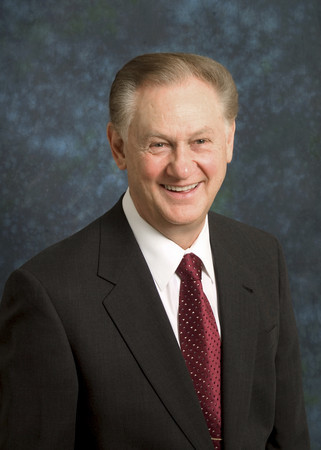Schools superintendent says proposed cuts would cost 2,322 teacher jobs
CARSON CITY -- The president of the state teachers union refused Thursday to support cutting teacher salaries to help solve Nevada's $881 million tax revenue shortfall unless the cut is approved through collective bargaining negotiations.
"I am here today to tell you enough is enough," Nevada State Education Association President Lynn Warne told the Legislature's Interim Finance Committee. "You are asking an already strained system to absorb more devastation. We are all tired of the hand-wringing that there is no appetite for tax increases."
Gov. Jim Gibbons and legislators have agreed not to propose tax increases to cover the shortfall because the state's unemployment rate is 13 percent and private businesses are laying off workers.
Warne made her comments after Clark County School District Superintendent Walt Rulffes said he would have to lay off 2,322 teachers and increase class sizes by six students if he must cut spending by 10 percent because of declining state tax revenue. He later clarified that this would occur if the cuts were made only in teaching positions, but in reality, cuts would be made in support and administrative personnel too.
He said his district, the fifth largest in the nation, instead could shorten its school year by 17 days if legislators and the governor agree and choose that option as a way to reduce $150 million of the shortfall.
Teacher pay in Nevada averaged $48,257 a year in 2008, below the $50,852 national average, according to a recent Las Vegas Chamber of Commerce study.
"We are just not doing right by our kids," Assembly Speaker Barbara Buckley, D-Las Vegas, said after Rulffes spoke.
Buckley said the superintendent's layoff estimates were based on a 10 percent reduction when the Legislature and Gibbons must make budget reductions of more than 20 percent to balance the budget between March and June 30, 2011.
"Desperate times call for desperate measures," she said. "If your cut level is doubled, that is 4,000 teachers (laid off)."
As an alternative, she said the state might have no choice but to take money that school districts have set aside through voter-approved bond issues that would have been spent building new schools.
"I am not advocating it," Buckley replied. "I am merely trying to get all of our options on the table."
Gibbons, who attended part of Thursday's hearing, is seeking a $166 million, 10 percent, reduction in public education spending.
He will deliver a special State of the State address at 6 p.m. Monday during which he will outline how he proposes to cut the nearly $900 million in state spending. He will announce when he will call the Legislature into special session to approve cuts.
Rather than laying off employees, Rulffes prefers a "shared sacrifice" by school employees that would include lower pay, a shorter school year and other cuts.
He used only teachers in his example of cutting the district budget, but Rulffes said any layoffs also would include administrators and other school workers.
The superintendent told legislators he can lay off workers on his own, but reducing the school year and cutting salaries needs the approval of school employee unions.
Gibbons announced earlier this week that he favors the temporary suspension of collective bargaining rights as a way to secure wage and other concessions. He also spoke of cutting salaries of state workers and teachers by 6 percent.
But Warne, whose union represents more than 29,000 teachers and education professionals in the state, said Thursday the state by can suspend collective bargaining for natural disasters, riots and other emergencies only, not for financial reasons.
State Senate Minority Leader Bill Raggio, R-Reno, asked her to make salary concessions, noting that he is the father of a teacher and that he does not want massive education layoffs anywhere in Nevada.
"Unless your association wants to reopen contract negotiations and agree to salary reductions, the alternative is layoffs," Raggio said.
Warne responded that people should not fear the negotiation process. She said that the union agreed to unpaid furloughs of teachers and other employees in White Pine and other small counties.
If the union could look at all school financial resources, then Warne said union officials might find a source of revenue available to prevent cuts.
"Everything should be on the table," she said.
Before renegotiating contracts, Rulffes said superintendents need the Legislature to declare a "fiscal emergency" to give them "legislative cover" in such talks.
The negotiations could last months, and if an impasse occurred, an arbitrator would be chosen. There is no guarantee the arbitrator would agree with the school districts, he said.
Jim Wells, a deputy superintendent with the Nevada Department of Education, said Hawaii, Oregon, Georgia and North Carolina have cut their school years because of declining revenue.
Nevada could save $13 million a day in salaries and benefits to school employees if it took the same option.
Wells said that by law, Nevada's school year is 180 days, but depending on the districts, there are as many as four non-instructional days when students are not present.
In some districts, such as Clark County, the four non-instructional days are on top of the 180 instructional days.
"This is where we should look" if cuts are necessary," state Senate Majority Leader Steven Horsford said about the non-instructional days.
Rulffes said the school superintendents around the state don't want to be told how to cut spending; they want to know how much will be cut from their budgets and then make the decisions themselves.
Eliminating all athletics in his district would save only $5 million, and ending band and other after school activities would save only $6 million, Rulffes said.
Review-Journal writer James Haug contributed to this report. Contact reporter Capital Bureau Chief Ed Vogel at evogel@reviewjournal.com or 775-687-3901.





























